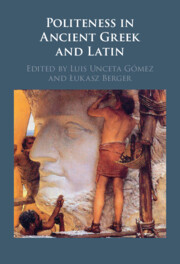Book contents
- Politeness in Ancient Greek and Latin
- Politeness in Ancient Greek and Latin
- Copyright page
- Contents
- Figures and Tables
- Contributors
- Preface
- Abbreviations
- Part I Introduction
- Part II The Expression of Im/Politeness
- Part III Im/Politeness in Use
- Part IV Ancient Perceptions on Im/Politeness
- Chapter 12 Being Polite the Roman Way
- Chapter 13 Impoliteness outside Literature
- Chapter 14 Politeness in Ancient Scholarship
- Glossary
- References
- Index Rerum
- Index Locorum
Chapter 13 - Impoliteness outside Literature
The Colloquium Harleianum*
from Part IV - Ancient Perceptions on Im/Politeness
Published online by Cambridge University Press: 08 September 2022
- Politeness in Ancient Greek and Latin
- Politeness in Ancient Greek and Latin
- Copyright page
- Contents
- Figures and Tables
- Contributors
- Preface
- Abbreviations
- Part I Introduction
- Part II The Expression of Im/Politeness
- Part III Im/Politeness in Use
- Part IV Ancient Perceptions on Im/Politeness
- Chapter 12 Being Polite the Roman Way
- Chapter 13 Impoliteness outside Literature
- Chapter 14 Politeness in Ancient Scholarship
- Glossary
- References
- Index Rerum
- Index Locorum
Summary
This chapter investigates impoliteness in subliterary texts, namely in bilingual teaching material for learning languages. It takes the Colloquium Harleianum, one of the conversation manuals in the Hermeneumata Pseudodositheana (second to third century CE) as a corpus. The chapter studies both impoliteness forms and their evaluations from culture-internal speakers. The impoliteness forms, the metalanguage and the metapragmatic comments on the quarrel represented in this corpus are compared with quarrels represented in literary texts, mainly Roman Comedy (second to third century BCE) and the novel (second cetury CE). It relies on metapragmatic comments as the main entry to the emic evaluations of impoliteness forms and of offences present in the corpus. In this way, the chapter provides a diachronic perspective on ancient impoliteness in Latin by taking into account both literary and subliterary evidence. By dealing with teaching manuals, it provides a unique contribution on pragmatic competence for non-native speakers, and it offers insights on the etiquette norms for the elite, which is the perspective that the evidences in the corpus reflect.
Keywords
- Type
- Chapter
- Information
- Politeness in Ancient Greek and Latin , pp. 317 - 340Publisher: Cambridge University PressPrint publication year: 2022

